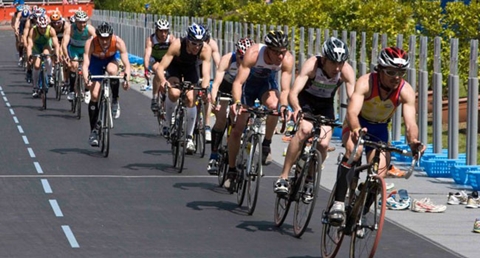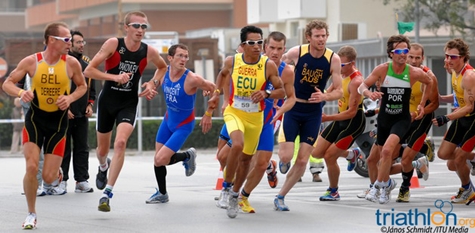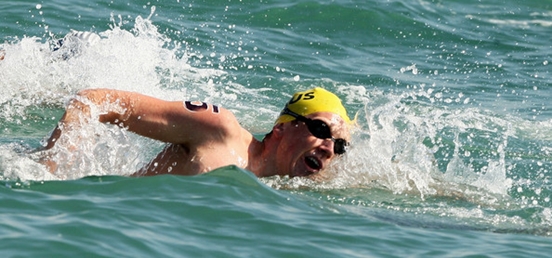The Ideal Performance State (IPS) in sports or Peak Performance for athletes is the optimal physiological and pyschological level of arousal measured by muscular tension, heart rate, blood pressure, brain wave patterns and breathing composure that results in peak performance. IPS is an important state to achieve for the endurance sports such as Running, Cycling and Swimming. IPS maximizes genetic talent. The IPS exists for every athlete. When in IPS, the athlete experiences highly distinctive patterns of feelings and thoughts which enable top performance. IPS is similar to being in the “Flow”. IPS involves all levels of human existence: body, mind, emotions, spirit and creativity. IPS is reached by being in all of the following state:
- Personally challenged
- Energized with positive emotions
- Ready for fun and enjoyment
- Focused and alert
- On automatic instinct
- Relaxed and calm
- Maintaining confidence
Emotions play a key role in performance as they directly connect to arousal. Emotions are biochemical events in the brain that lead to powerful biochemical changes in the body that impact athletic performance. Empowering emotions are associated with drive, challenge, determination, persistence, fight, high energy, spirit and fun. Disempowering emotions are associated with anger, fear, temper, fatigue, helplessness, confusion, low energy.
Toughness is built with the discipline of maintaining empowering emotions under the most difficult and challenging circumstance.
IPS of calmness, awareness and focus create certain neurological arousal patterns within the brain. These brain patterns create a freedom that enables excellence. Researchers have found superior performers typically report an absence of conscious regulation of or “thinking” about performance. Also, psychological mechanisms are of foundation of expert psychomotor performance. It's interesting to note that expert performers require less neural activation than novices for physical performance as they have developed psychomotor efficiency!
The connections between emotions and internal physical chemistry are direct. One impacts the other. Diet plays such a key role in achieving IPS. Low blood sugar and low adrenaline levels are diet related and often the result of insufficient and poor quality carbohydrate intake.
Ideal Performance State for Everyone
The Ideal Performance State focused on athletic performance can be applied to everyone from the corporate executive, attorney, physician, student, parent and well, to everyone. Recently theorists have addressed the spiritual dimension—how deeper values and a sense of purpose influence performance. A successful approach to sustained high performance by everyone adopts a holistic approach that pulls together all of the Ideal Performance State elements and consider the person as a whole. Thus, an integrated theory of performance management addresses the body, the emotions, the mind, and the spirit.
Jim Loehr and Tony Schwartz, The Making of a Corporate Athlete, Harvard Business Review, theorized that the same principles and skills of Ideal Performance State that have been found in top athletes can be applied to executives to help them perform at their highest potential. Although the ‘Corporate Athlete’ writing focused upon executives, the approach can be applied to everyone in all roles of life.
High Performance Pyramid
- Spiritual Capacity
Provides a powerful source of motivation, determination and endurance- Mental Capacity
Focuses physical and emotional energy on the task at hand- Emotional Capacity
Creates the internal climate that drives the Ideal Performance State- Physical Capacity
Builds endurance and promotes Mental and emotional recovery
The premise here is that peak performance in not simply a matter of sheer brain power, but is a state of being where there is a strong and balanced spiritual, mental, emotional and physical capacity. Peak performance is achieved and maintained when the four levels are working together.
Physical Capacity
Notice that the foundation for the Ideal Performance State is physical well-being. Vigorous exercise produces a sense of emotional well-being which clears the way for peak mental performance. This higher sense of emotional well-being has a physiologically base in part resulting from the increased movement of blood throughout the body bringing nutrients and challenging the cells and organs to perform at a higher level. 1Vigor has a free online Exercise Log to help you track your exercise progress and help you stick with an exercise program.
Emotional Capacity
The next building block of the Ideal Performance State is emotional Capacity. An ideal emotional state of being is one of balance. This balanced emotional state includes many positive sensations such as calmness, optimism, focus, confidence, joy, happiness and complete engagement.
Negative emotions such as frustration, impatience, anger, fear, resentment and sadness tend to distract from complete engagement and can drain energy. Negative emotions can increase heart rate, blood pressure and muscle tension and otherwise create an inefficient metabolism.
Mental Capacity
Mental Capacity is the third level of the performance pyramid. Mental capacity is enhanced through improving our cognitive capacities such as focus, Clear Thinking Skills. Focus is the ability to concentrate energy in the service of a particular productive goal. Focus skills can be improved by practicing some form of meditation and or breathing composure technique.
Maintaining a good diet that improves Brain Nutrition and includes some of the Top Ten Brain Foods plays an important role in improving Mental Capacity.
Spiritual Capacity
Spiritual Capacity is simply the energy that is unleashed by aligning our energy with our deepest values and lifelong productive purposes. This alignment is a powerful source of motivation.
Developing Leadership Skills can help you attain your Ideal Performance State.
More about Ralph Teller. See Ralph's 1Vigor Log Calendar.






